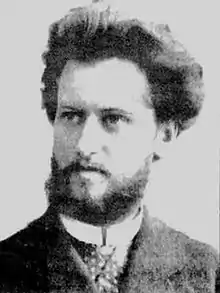Zygmunt Balicki
Zygmunt Balicki (30 December 1858 in Lublin – 12 September 1916 in Saint Petersburg) was a Polish sociologist, publicist and one of the first leading thinkers of the modern Polish nationalism in the late 19th century under the foreign Partitions of Poland.[1] Balicki developed his original political thought inspired by the ideals of Aleksander Świętochowski from the movement of Positivism which was marked by the attempts at trying to stop the wholesale Russification and Germanization of the Poles ever since the Polish language was banned in reprisal for the January Uprising.[2] Along with Roman Dmowski, Balicki was a key protagonist in the National Democratic campaign of antisemitic agitation.[3]
Zygmunt Balicki | |
|---|---|
 | |
| Born | 30 December 1858 |
| Died | 12 September 1916 (aged 57) |
| Nationality | Polish |
| Occupation | Sociologist, politician, writer |
| Spouse(s) | Gabriela Balicka-Iwanowska (married 1891) |
Life
Balicki was born into a noble Polish szlachta family of Seweryn and Karolina née Pruszyńska in Lublin under the Russian Partition.[1] He studied social sciences at universities in Saint Petersburg, Zürich and Geneva. He held a doctorate from the University of Geneva.[4]
His book Egoizm narodowy wobec etyki (National Egoism and Ethics) published first in 1903 was one of the central texts of nascent National Democratic movement.[4] Balicki argued that the individual should fuse spiritually with his society and adopt its desires and goals as his own.[5] He rejected altruism, ideals and ethics of the romantic literature as "abstract" and "naive". Together with Roman Dmowski he founded National League and National-Democratic Party.
In 1891 he married Polish botanist Gabriela Balicka-Iwanowska.[6]
Works
- Hedonizm jako punkt wyjścia etyki (1900)
- Egoizm narodowy wobec etyki (National Egoism and Ethics) (1903)
- Metody nauk społecznych i ich rozwój w XIX stuleciu (1903)
- Parlamentaryzm : zarys socylologiczny Vol 1–2 (1900, 1906)
- Psychologia społeczna : czynności poznawania (1912)
- Z doby przełomu myśli narodowej (1916)
Notes
- Grzegorz Czajka (2010). "Zygmunt Balicki jako ideolog polskiej myśli narodowej" (PDF file, direct download). Uniwersytet Jagiellonski (in Polish). Kraków. Katedra Historii Doktryn Politycznych i Prawnych (Wydział Prawa i Administracji): 8–15/104.
- Norman Davies. Rossiya (Google books preview). God's Playground A History of Poland: Volume II: 1795 to the Present. Oxford University Press. p. 64. Retrieved 19 August 2014.
- Wyrwa, Ulrich. "Anti-semitism in Europe (1879–1914): Lines of inquiry, conception and objectives of the research seminar at the center for anti-semitism research." Annals of the University of Bucharest/Political science series 13.1 (2011): 3–17.
- Porter 1992, 640.
- Porter 1992, 645.
- Creese, Mary R. S. (2015). Ladies in the Laboratory IV: Imperial Russia's Women in Science, 1800–1900: A Survey of Their Contributions to Research. Rowman & Littlefield. pp. 115–116. ISBN 9781442247420. Retrieved 20 August 2018.
References
- Bullen, Roger J.; Hartmut Pogge von Strandmann; A. B. Polonsky (eds) (1984). Ideas into Politics: Aspects of European History, 1880–1950. London: Taylor & Francis. ISBN 0-7099-0696-X.CS1 maint: multiple names: authors list (link) CS1 maint: extra text: authors list (link)
- Porter, Brian A. (Winter 1992). "Who is a Pole and Where is Poland? Territory and Nation in the Rhetoric of Polish National Democracy before 1905". Slavic Review. 51 (4): 639–53. doi:10.2307/2500129.
- Dawidowicz, Aneta (2006). Zygmunt Balicki (1858-1916): Działacz i teoretyk polskiego nacjonalizm. Kraków: Nomos. ISBN 83-60490-12-0.
- Grott, Bogumił (1995). Zygmunt Balicki - ideolog Narodowej Demokracji. Kraków: Arcana. ISBN 83-86225-90-4.